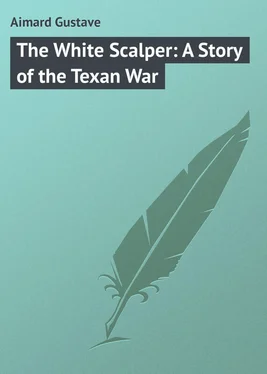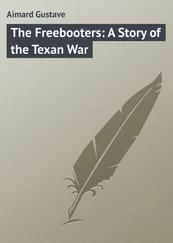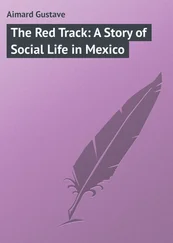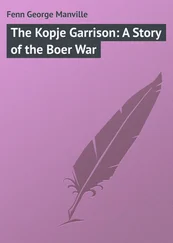Gustave Aimard - The White Scalper - A Story of the Texan War
Здесь есть возможность читать онлайн «Gustave Aimard - The White Scalper - A Story of the Texan War» — ознакомительный отрывок электронной книги совершенно бесплатно, а после прочтения отрывка купить полную версию. В некоторых случаях можно слушать аудио, скачать через торрент в формате fb2 и присутствует краткое содержание. Жанр: foreign_language, foreign_prose, на английском языке. Описание произведения, (предисловие) а так же отзывы посетителей доступны на портале библиотеки ЛибКат.
- Название:The White Scalper: A Story of the Texan War
- Автор:
- Жанр:
- Год:неизвестен
- ISBN:нет данных
- Рейтинг книги:4 / 5. Голосов: 1
-
Избранное:Добавить в избранное
- Отзывы:
-
Ваша оценка:
- 80
- 1
- 2
- 3
- 4
- 5
The White Scalper: A Story of the Texan War: краткое содержание, описание и аннотация
Предлагаем к чтению аннотацию, описание, краткое содержание или предисловие (зависит от того, что написал сам автор книги «The White Scalper: A Story of the Texan War»). Если вы не нашли необходимую информацию о книге — напишите в комментариях, мы постараемся отыскать её.
The White Scalper: A Story of the Texan War — читать онлайн ознакомительный отрывок
Ниже представлен текст книги, разбитый по страницам. Система сохранения места последней прочитанной страницы, позволяет с удобством читать онлайн бесплатно книгу «The White Scalper: A Story of the Texan War», без необходимости каждый раз заново искать на чём Вы остановились. Поставьте закладку, и сможете в любой момент перейти на страницу, на которой закончили чтение.
Интервал:
Закладка:
"As it is so, listen to me attentively, and carefully weigh your answer, before opening your mouth to give it."
"Speak, General."
"This moment, – you understand, this moment, Señor, you will confess to me, where the man is who gave you this letter, if not – "
"Well?" the American nominally interrupted.
"Within ten minutes you will be hanging from a branch of that tree, close to you."
Davis gave him a disdainful glance.
"On my soul," he said ironically, "you Mexicans have a strange way of treating envoys."
"I do not recognise the right of a scoundrel, who is outlawed for his crimes, and whose head is justly forfeited, to send me envoys, and treat with me on an equal footing."
"The man whom you seek in vain to brand, General, is a man of heart, as you know better than anybody else. But gratitude is as offensive to you as it is to all haughty minds, and you cannot forgive the person to whom we allude, for having saved, not only your life, but also your honour."
John Davis might have gone on speaking much longer, for the General, who was as pale as a corpse, and whose features were contracted by a terrible emotion he sought in vain to master, seemed incapable of uttering a syllable. Colonel Melendez had quietly approached the circle. For some minutes he had listened to the words the speakers interchanged, with gradually augmenting passion; judging it necessary, therefore, to interpose ere matters had reached such a point as rendered any hope of conciliation impossible, he said to John Davis, as he laid his hand on his shoulder:
"Silence! You are under the lion's claw, take care that it does not rend you."
"Under the tiger's claw you mean, Colonel Melendez," he exclaimed, with much animation. "What! Shall I listen calmly to an insult offered the noblest heart, the greatest man, the most devoted and sincere patriot, and not attempt to defend him and confound his calumniator? Come, Colonel, that would be cowardice, and you know me well enough to feel assured that no consideration of personal safety would force me to do so."
"Enough," the General interrupted him, in a loud voice, "that man is right; under the influence of painful reminiscences I uttered words that I sincerely regret. I should wish them forgotten."
John Davis bowed courteously.
"General," he said, respectfully, "I thank you for this retraction; I expected nothing less from your sense of honour."
The General made no answer; he walked rapidly up and down, suffering from a violent agitation.
The officers, astonished at this strange scene, which they did not at all understand, looked restlessly at each other, though not venturing to express their surprise otherwise. The General walked up to John Davis and stopped in front of him.
"Master Davis," he said to him, in a harsh and snapping voice, "you are a stout-hearted and rough-spoken man. Enough of this; return to the man who sent you, and tell him this: 'General Don José Maria Rubio will not consent to enter into any relations with you; he hates you personally, and only wishes to meet you sword in hand. No political question will be discussed between you and him until you have consented to give him the satisfaction he demands.' Engrave these words well in your memory, Señor, in order to repeat them exactly to the said person."
"I will repeat them exactly."
"Very good. Now, begone, we have nothing more to say to each other. Colonel Melendez, be good enough to give this Caballero a horse, and accompany him to the outposts."
"One word more, General."
"Speak."
"In what way shall I bring you the person's answer?"
"Bring it yourself, if you are not afraid to enter my camp a second time."
"You are well aware that I fear nothing, General. I will bring you the answer."
"I wish it; good-bye."
"Farewell," the American answered.
And bowing to the company, he withdrew, accompanied by the Colonel.
"You played a dangerous game," the latter said, when they had gone a few steps; "the General might very easily have had you hung."
The American shrugged his shoulders.
"He would not have dared," he said, disdainfully.
"Oh, oh! and why not, if you please?"
"How does that concern you, Colonel; am I not free?"
"You are."
"That must be sufficient for you, and prove to you that I am not mistaken."
The Colonel led the American to his quarters, and asked him to walk in for a moment, while a horse was being got ready.
"Master Davis," he said to him, "be good enough to select from those weapons, whose excellence I guarantee, such as best suit you."
"Why so?" he remarked.
"Confound it! you are going to travel by night; you do not know whom you may meet. I fancy that under such circumstances it is prudent to take certain precautions."
The two men exchanged a glance; they understood each other.
"That is true," the American said, carelessly; "now that I come to think of it, the roads are not safe. As you permit me, I will take these pistols, this rifle, machete, and knife."
"As you please, but pray take some ammunition as well; without that your firearms would be of no service."
"By Jove! Colonel, you think of everything, you are really an excellent fellow," he added, while carelessly loading his rifle and pistols, and fastening to his belt a powder flask and bullet pouch.
"You overwhelm me, Master Davis; I am only doing now what you would do in my place."
"Agreed. But you display a graciousness which confuses me."
"A truce, if you please, to further compliments. Here is your horse, which my assistant is bringing up."
"But he is leading a second; do you intend to accompany me beyond the advanced posts?"
"Oh, only for a few yards, if my company does not seem to you too wearisome."
"Oh, Colonel, I shall always be delighted to have you for a companion."
All these remarks were made with an accent Of excessive courtesy, in which, however, could be traced an almost imperceptible tinge of fun and biting raillery. The two men left the house and mounted their horses. The night was limpid and clear; millions of stars sparkled in the sky, which seemed studded with diamonds; the moon spread afar its white and fantastic light; the mysterious night breeze bowed the tufted crests of the trees, and softly rippled the silvery waters of the Rio Trinidad, as they died away amorously on the bank.
The two men walked side by side, passing without being challenged by the sentinels, who, at a signal from the Colonel, respectfully stepped back. They soon descended the hill, passed the main guard, and found themselves in the open country. Each of them yielded to the voluptuous calmness of nature, and seemed no longer to be thinking of his comrade. They proceeded thus for more than an hour, and reached a spot where two paths, in crossing, formed a species of fork, in the centre of which stood a cross of evil omen, probably erected in memory of a murder formerly committed at this solitary spot.
As if by common accord, the two horses stopped and thrust out their heads, while laying back their ears and snorting loudly. Suddenly aroused from their reveries and recalled to actual life, the two riders drew themselves up in the saddle, and bent a scrutinising glance around. No human sound disturbed the silence; all around was calm and deserted as in the first days of creation.
"Do you intend, my dear Colonel," the American asked, "to honour me with your charming society any longer?"
"No," the young man answered, bluntly; "I shall stop here."
"Ah!" John Davis continued, with feigned disappointment, "shall we part already?"
"Oh no," the Colonel answered, "not yet."
"In spite of the extreme pleasure I should feel in remaining longer in your company, I am obliged to continue my journey."
Читать дальшеИнтервал:
Закладка:
Похожие книги на «The White Scalper: A Story of the Texan War»
Представляем Вашему вниманию похожие книги на «The White Scalper: A Story of the Texan War» списком для выбора. Мы отобрали схожую по названию и смыслу литературу в надежде предоставить читателям больше вариантов отыскать новые, интересные, ещё непрочитанные произведения.
Обсуждение, отзывы о книге «The White Scalper: A Story of the Texan War» и просто собственные мнения читателей. Оставьте ваши комментарии, напишите, что Вы думаете о произведении, его смысле или главных героях. Укажите что конкретно понравилось, а что нет, и почему Вы так считаете.












